|
|
|
Sort Order |
|
|
|
Items / Page
|
|
|
|
|
|
|
| Srl | Item |
| 1 |
ID:
186196
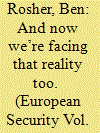

|
|
|
|
|
| Summary/Abstract |
Though conspicuous by its absence in debates among the British political and media establishments during the EU referendum campaign, the Irish border has been the central feature of Brexit as the implications and complications of trying to “take back control of borders” have become apparent. Drawing on focus group data gathered between 2017 and 2019 I employ ontological security theory to investigate the impact that Brexit is having on residents and communities living in the central Irish border region. In particular, I draw on the work of David Carr to explore the social role of memory and narrative in ontological (in)security and how this has manifested in the border region throughout the Brexit process. I find that the uncertainties generated by Brexit have caused border residents to draw on anxiety-filled memories and narratives from the securitised border of the pre-Good Friday Agreement era which they then project onto and vicariously through the next generation who, in turn, embody these anxieties, creating intergenerational ontological insecurity. Brexit has reintroduced, if not the physical border, the psychological borders of the past.
|
|
|
|
|
|
|
|
|
|
|
|
|
|
|
|
| 2 |
ID:
098151
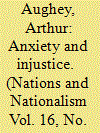

|
|
|
|
|
| Publication |
2010.
|
| Summary/Abstract |
An explicit and politically mobilised English nationalism has been remarkable because of its absence from deliberation on constitutional change in the United Kingdom. In short, it remains a mood and not a movement. This article explores the mood and explains why that mood has not become, as yet, a movement. It examines three related aspects of the English nationalist mood. First, it considers anxieties about the condition of contemporary England which can be found in the work of intellectuals and artists. Second, it identifies the sense of injustice which animates the lobby group the Campaign for an English Parliament. Finally, it looks at how mainstream party politics responds to these national anxieties and that sense of national injustice.
|
|
|
|
|
|
|
|
|
|
|
|
|
|
|
|
| 3 |
ID:
189992
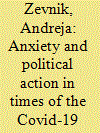

|
|
|
|
|
| Summary/Abstract |
Since the beginning of the global Covid-19 pandemic in the spring of 2020 countries across the world have implemented various measures to contain the virus. They have restricted public gatherings, mobility and congregation of people at homes and in public places. These restrictions however did not stop another chain of events – the global Black Lives Matter (BLM) protests. In the summer of 2020 people across the globe mobilised to protest the police killing of George Floyd. In the UK the protest for Black Lives took place in all major cities, but they also continued weekly in smaller communities by ‘taking the knee’. What interests me in this contribution is how anxieties experienced during the global pandemic contributed to the mobilisation of large-scale political actions for racial justice and how might we consider anxiety as a mobilising force in political space in times of global pandemic in particular in the context of anti-racist protests such as BLM. This forum contribution opens by considering how global pandemic aided conditions for political action for racial justice, before discussing the role of anxiety in political mobilising. Here I first detailed how anxiety is understood in Lacanian psychoanalysis before considering what it tells us about the BLM protests for racial justice and specifically the removal of the Colston statue during the Bristol protest on June 7 2020.
|
|
|
|
|
|
|
|
|
|
|
|
|
|
|
|
| 4 |
ID:
189989
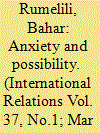

|
|
|
|
|
| Summary/Abstract |
This is the introduction to the forum, Anxiety and possibility: the many future(s) of COVID-19. It summarizes the contributions within a common framework and situates them in the extant literature.
|
|
|
|
|
|
|
|
|
|
|
|
|
|
|
|
| 5 |
ID:
189993
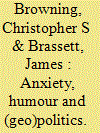

|
|
|
|
|
| Summary/Abstract |
Humour is usually overlooked in analyses of international politics, this despite its growing prevalence and circulation in an increasingly mediatised world, with this neglect also evident in the growing literature on ontological security and anxiety in IR. Humour, though, needs to be taken seriously, crossing as it does the high-low politics divide and performing a variety of functions. In the context of the Covid pandemic we argue that the link between humour and anxiety has been evident in three notable respects: (i) functioning as a (sometimes problematic) form of stress relief at the level of everyday practices of anxiety management, (ii) working to reaffirm biographical narratives of (national) community and status and (iii) most significantly for IR, as a form of anxiety geopolitics.
|
|
|
|
|
|
|
|
|
|
|
|
|
|
|
|
| 6 |
ID:
160621
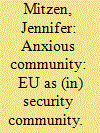

|
|
|
|
|
| Summary/Abstract |
From the Eurocrisis to the migration crisis, and from Brexit to a strengthening far right, the European Union (EU) faces multiple stressors. But while crises unleash anxiety, they do not necessarily portend the worst: because they disrupt old routines, crises can open space for new political possibilities. As a self-consciously hybrid, ‘post-national’ political form, the EU would seem poised to take advantage. Instead it is stuck. In this paper, taking an ontological security approach and focusing on EU migration governance, I propose that one cause of paralysis could lie – ironically – in an aspect of the EU that is crucial to its normative power: Europe’s long peace. An ontological security perspective highlights the management of existential anxiety as crucial to identity, suggesting how different modes of anxiety management have different political effects. Applied here, EU narratives and routines preserving ‘no war’ might suppress relations of structural power; they might mimic primitive defense mechanisms; or they might be symptoms pointing to unconscious processes keeping difficult knowledge – including colonial pasts – undealt with. I suggest how migration governance might manifest these mechanisms, contributing to the difficulties of desecuritising migration and linking its governance to EU values and institutions.
|
|
|
|
|
|
|
|
|
|
|
|
|
|
|
|
| 7 |
ID:
145641
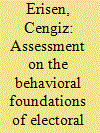

|
|
|
|
|
| Summary/Abstract |
Turkish politics has overcome several challenges in order to reach a situation with less political uncertainty. Among several issues, voter behavior in the two recent general elections in 2015 is a major topic of interest. In this think-piece, I discuss the behavioral indicators of vote choice and political judgments between the two 2015 elections. To that end, I first explore the context of public polarization before introducing the behavioral approaches to explain voter behavior. I use nationally representative survey data in order to make descriptive inferences that shed light on the unexpected change in electoral behavior.
|
|
|
|
|
|
|
|
|
|
|
|
|
|
|
|
| 8 |
ID:
131700
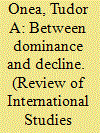

|
|
|
|
|
| Publication |
2014.
|
| Summary/Abstract |
This article investigates the role of status considerations in the response of dominant powers to the rise of emergent states. Accordingly, the hypothesis explored is that dominant actors are prone to fear that they will lose their upper rank, and, due to this status anxiety, resist the efforts of emergent powers to match or surpass them. The article begins by explaining why political actors deem status important and puts forward a theory of status anxiety in world politics. The more pronounced is this anxiety across status dimensions (economic and military capabilities as well as prestige), the higher the likelihood of conflict. This argument is then tested against competing theories of dominant power behaviour in two cases: the relations between France and Britain from the 1740s to Napoleon and those between Britain and Germany from the 1880s to World War One.
|
|
|
|
|
|
|
|
|
|
|
|
|
|
|
|
| 9 |
ID:
160618
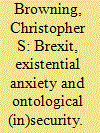

|
|
|
|
|
| Summary/Abstract |
This article explores how the Brexit Referendum on the UK's membership of the European Union has been a source of destabilisation, dread and ontological anxiety. Focusing mainly on British citizens who voted or self-identified as “Remainers”, and on EU foreign nationals resident in the UK, it shows how existential anxieties have had different points of focus for different groups of people. Confronted with such destabilising anxieties, the article shows how people have adopted different mechanisms designed to reassert a sense of order and certitude often viewed as central to preserving ontological security. The ways in which this has been done, however, can themselves raise important questions.
|
|
|
|
|
|
|
|
|
|
|
|
|
|
|
|
| 10 |
ID:
117608
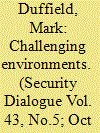

|
|
|
|
|
| Publication |
2012.
|
| Summary/Abstract |
Despite the widespread perception of danger, the aid industry continues to expand within challenging political environments. As a way of reducing risk, this expansion has been accompanied by the 'bunkerization' of international aid workers. While this development is largely viewed by the industry as an unfortunate response to a decline in external security, a more holistic approach is used here to explain the consequent paradox of liberal interventionism: an expansion that is simultaneously a remoteness of international aid workers from the societies in which they operate. The demise of modernist legal, moral and political constraints, together with a decline in the political patronage that aid agencies enjoy, has been important in shaping the new risk terrain. At the same time, these changes embody a profound change in the way contingency is approached. Earlier modernist forms of protection have been replaced by postmodernist calls for resilience and the acceptance of risk as an opportunity for enterprise and reinvention. Within the aid industry, however, field-security training represents a countervailing attempt to govern aid workers through anxiety. Resilience, in the form of 'care of the self' techniques, becomes a therapeutic response to the fears induced in this way. Viewed from this perspective, apart from reducing risk, the bunker has important therapeutic functions in a world that aid workers no longer understand or feel safe in.
|
|
|
|
|
|
|
|
|
|
|
|
|
|
|
|
| 11 |
ID:
189991
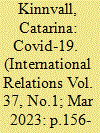

|
|
|
|
|
| Summary/Abstract |
This short article discusses how different fantasy narratives have come together during the Covid-19 crisis in various far-right movements, parties and audiences across the world and how much of these fantasies rely on racialised and gendered notions of a fantastical world-order in which particular forms of emotional governance provide a relief and sense of security to certain societal groups. This involves a close engagement with crisis and crisis narratives in relation to ontological insecurity and anxiety; how such crisis narratives have materialised in fantasies related to borders and corona nationalism, and the emotional governance of these particular fantasies in the hands of populist leaders and their increasingly receptive audiences.
|
|
|
|
|
|
|
|
|
|
|
|
|
|
|
|
| 12 |
ID:
175472
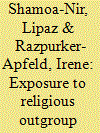

|
|
|
|
|
| Summary/Abstract |
Israel is often at the centre of debate regarding religious diversity. We examined how exposure to religious symbols is associated with intergroup anxiety perceived from the Jewish majority among Arab minority groups. We found that outgroup and ingroup priming had different consequences for the two Arab groups: when primed with outgroup Jewish concepts, Arab-Muslim persons reported higher intergroup anxiety than Arab-Christian participants. However, when primed with ingroup concepts, the two minority groups did not differ significantly in intergroup anxiety experienced in interactions with Jews. Our results convey the importance of investigating why and when religious diversity may have a negative impact on intergroup relations.
|
|
|
|
|
|
|
|
|
|
|
|
|
|
|
|
| 13 |
ID:
094848
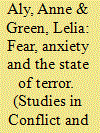

|
|
|
|
|
| Publication |
2010.
|
| Summary/Abstract |
The 11 September 2001 terrorist attacks on the World Trade Center and the Pentagon marked the advent of an unprecedented preoccupation with terrorism. Although Australia's actual terrorist risk profile remains marginal in comparison with other mortality risks, in times of crisis, the reasoned negotiation of risk is marginalised. Drawing on the findings of qualitative research, this article offers an analysis of how Australians are responding to the threat of terrorism embodied in a developing discourse of the war on terror and how they construct their perceptions of terrorist risk. The findings implicate community fear as a factor that should be considered in the development of counter terrorism strategies that emphasize community engagement as a mechanism for challenging radicalisation in democratic states.
|
|
|
|
|
|
|
|
|
|
|
|
|
|
|
|
| 14 |
ID:
160613
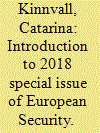

|
|
|
|
|
| Summary/Abstract |
The European Union (EU) faces many crises and risks to its security and existence. While few of them threaten the lives of EU citizens, they all create a sense of anxiety and insecurity about the future for many ordinary Europeans. Amongst these crises are the more obvious challenges of sovereign debt and fiscal austerity; refugees from conflicts in Afghanistan, Iraq, and Syria; and the rise of populist far-right parties across Europe. But behind these challenges lie less visible insecurities about economic prospects, social wellbeing, and a widespread expectation that the EU is unable to answer the challenges of twenty-first century global politics. In other words, the greatest security challenge facing people across Europe is not physical, despite the threats of Putin and ISIS, but is a sense of fear and anxiety over their daily lives.
|
|
|
|
|
|
|
|
|
|
|
|
|
|
|
|
| 15 |
ID:
097223
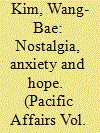

|
|
|
| 16 |
ID:
185189
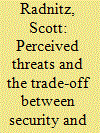

|
|
|
|
|
| Summary/Abstract |
It is well established that exposure to threats causes citizens to prioritize security considerations and accept restrictions on civil liberties. Yet most studies on which these findings are based come from longstanding democracies and do not distinguish among types of threat. This article argues that the effects of internal and external threats are conditional on regime type. It tests the argument via an experiment embedded in an original survey of Georgia and Kazakhstan, countries that vary in regime type but face similar levels of threat. In authoritarian Kazakhstan, there is no difference in attitudes by threat type, whereas external threats produce greater support for security than internal ones in more pluralistic Georgia. Contrary to previous research, security preferences are not mediated by the triggering of anxiety. The findings contribute to literatures on the link between threats and authoritarian preferences, the rally-round-the-flag effect, and the ways that political institutions mediate psychological processes.
|
|
|
|
|
|
|
|
|
|
|
|
|
|
|
|
| 17 |
ID:
166147
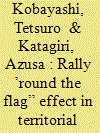

|
|
|
|
|
| Summary/Abstract |
This study examines the impact of China's growing territorial ambitions on Japanese public opinion. By experimentally manipulating perceived territorial threats from China, we tested two potential mechanisms of increased support for a conservative incumbent leader in Japan. The first is the “rally ’round the flag” model, in which threats universally boost support for the leader through emotion. The second is the “reactive liberal” model, in which support from conservatives remains constant, but threatened liberals move toward supporting the conservative leader. Two survey experiments provided no support for the emotion-based “rally ’round the flag” model, but they lent support for the reactive liberal model in explaining the impact on Japanese public opinion. However, the second experiment indicated that priming with an image of the prime minister that highlights his role as the supreme commander of the national defense forces completely eliminated the gain in approval rates among liberals.
|
|
|
|
|
|
|
|
|
|
|
|
|
|
|
|
| 18 |
ID:
148125
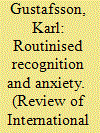

|
|
|
|
|
| Summary/Abstract |
Why do interstate relations deteriorate and become conflictual, even under conditions where one might expect improved ties? The article seeks an answer to this question through a case study of the deterioration in Sino-Japanese relations in the twenty-first century, which took place despite the existence of several factors that might be thought likely to have led to an improvement. Existing theoretical approaches cannot fully explain this puzzle. The article argues that such deteriorations can result from disruptions to states’ reciprocally performed routinised recognition, and identifies three mechanisms through which these can occur. To facilitate this argument, the article draws on scholarship on relational identity, recognition, and ontological security to develop a theory of identity construction that takes account of how self and other routinise the ways in which they recognise each other and how they react to the other’s representational practices.
|
|
|
|
|
|
|
|
|
|
|
|
|
|
|
|
| 19 |
ID:
164977
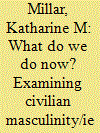

|
|
|
|
|
| Summary/Abstract |
In contemporary Western, liberal democratic societies, the soldier is frequently regarded as ‘the best of us’, taking on the unlimited liability for the protection and betterment of the whole. In the context of volunteer militaries and distant conflicts, the construction of men (and the universalised masculine citizen) as ‘always-already’ soldiers (or potential soldiers) poses a substantial obstacle to the identification or performance of ‘good’ civilian masculinity – particularly during wartime. The theorisation and articulation of a positive, substantive civilian masculinity, or masculinities, rather than one defined simply by an absence of military service and implication in the collective use of violence, is a central challenge of contemporary politics. As a means of illuminating the complex dynamics of this challenge, this article examines charitable practices of civilian support for the military, and corresponding constructions of masculinity, in the UK during the ‘war on terror’. In doing so, the article demonstrates the ways in which gendered ‘civilian anxiety’, through its connection to citizenship, comes to condition the political possibilities and subjectivities of all those who seek belonging in the liberal political community. The article concludes by arguing for the essentiality of a research programme oriented around ‘civilianness’, and civilian masculinity/ies.
|
|
|
|
|
|
|
|
|
|
|
|
|
|
|
|
|
|
|
|
|